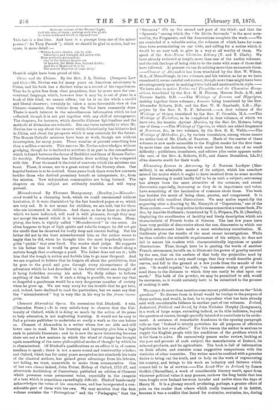Clementis Alerandrini Opera. Ex reconsione Gal. Dindorfii. 4 vols. (Clarendon
Press.)—It is very satisfactory to observe that the Uni- versity of Oxford, while it is doing so much by the action of its press to help education, is not neglecting learning. It would not be easy to find a private publisher to undertake so costly a work as the one before us. Clement of Alexandria is a writer whom few are able and still fewer care to read. But his learning and ingenuity give him a high rank in patristic literature ; and he is now the more interesting because there are not a few matters in which the wheel of change has brought again something of the same philosophical modes of thought by which he is characterized. Of Dindorf's qualifications as an editor it is, of course, needless to speak ; there is not a more sound and trustworthy scholar ; and Oxford, which has for many years accepted as her standards his texts of the classical authors, has gained great advantage from his labours, not failing, we trust, meanwhile to make them remunerative. One of her own alumni indeed, John Potter, Bishop of Oxford, 1715-37, and afterwards Archbishop of Canterbury, published an edition of Clement which possesses some permanent value, especially in the exegesis of a text which is sometimes exceedingly difficult. Dindorf handsomely acknowledges the value of his annotations, and has incorporated a con- siderable part of them with his own. We may mention that the first volume contains the " Protrepticus " and the " Psedagogus," that the
Stromata" fills up the second and part of the third ; and that the Opuscula " among which the "De Divito Servando " is the most note- worthy, the Fragments, and the Annotations complete the work.—We are reminded of a valuable series, the volumes of which have for some time been accumulating on our table, and calling for a notice which it would be no easy task to give in a way at all worthy of them. We speak of the Ante-Nicene Christian Library (T. and T. Clark). We have already reviewed at length more than one of the earlier volumes, and cherish the hope of being able to do the same with some of those that have followed. At present we can do nothing more than enumerate them. —Clement of Alexandria has been translated by the Rev. W. Wilson, M.A., of Musselburgb, in two volumes, and his version, as far as we have examined it, seems careful and correct, though more time might have been advantageously spent in making it less bald and unattractive in style.— We have also to notice Tatian and Theophilus and the Clementine Recog- nitions, translated by the Rev. R. B. Platten, Marcus Dods, A.M., and Thomas Smith, D.D. —The Writings of Iremeus and Hippolytus, making together three volumes ; lrenceus being translated by the Rev. Alexander Roberts, D.D., and the Rev. W. H. Rarnbault, A.B. ; Hip- polytus by the Rev. S. T. F. Salmond.—A first volume of the Writings of Origen, translated by the Rev. F. Crombie, M.A.—The Writings of Tertullian, to be completed in four volumes, of which we have two, the treatise Against Marcion, by the Rev. Dr. Holmes, being one of them. --The Writings of Cyprian, to which are added fragments of Novattan, &e., in two volumes, by the Rev. R. E. Wallis.—The Writings of Methodius, 6-c., by various translators, among whose names we notice that of Mr. Clark, of Taunton. Much of the matter of these volumes is now made accessible to the English reader for the first time. In more than one instance, the work must have been one of no small difficulty ; publishers, translators, and editors (the series appears under the care of the Rev. A. Roberts, D.D., and James Donaldson, LL.D.) alike deserve credit for their work.


































 Previous page
Previous page